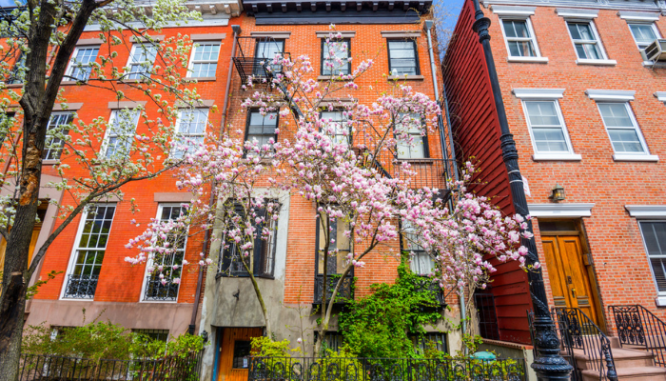Should You Sell Your City Home for Greener, Suburban Pastures?
- Published on
- 4 min read
-
 Valerie Kalfrin Contributing AuthorClose
Valerie Kalfrin Contributing AuthorClose Valerie Kalfrin Contributing Author
Valerie Kalfrin Contributing AuthorValerie Kalfrin is a multiple award-winning journalist, film and fiction fan, and creative storyteller with a knack for detailed, engaging stories.
As the coronavirus pandemic drags on, some city dwellers are eyeing the affordable square footage and open spaces that suburban living offers, even going so far as to sell their current home for the ability to relocate.
In fact, in our survey of over 2,000 real estate agents for Q2 2020, we found the desire to leave the city (37% of respondents) ranked within the top 3 reasons motivating people to move during this health crisis.
“People want to get away from the hype. They want more relaxation,” says Vendela Bonner, a real agent of more than a decade serving the Philadelphia, Pennsylvania, area.
In a time when the virus has diluted many of the traditional city allures such as a short office commute and access to renowned restaurants, it’s easy to see why so many are high-tailing it out of dodge. Moving to the suburbs is a life-changing decision, though, and it’s not one you want to make lightly.
So before you throw caution to the wind and do something as drastic as put your house on the market, here’s how to make sure you’re not upending your lifestyle strictly because of pandemic panic or the fleeting satisfaction of change.

Reasons to sell that city house already
It’s tempting to find more wide-open spaces during the pandemic — or to move because of an upheaval in work or schooling.
HomeLight’s Q3 2020 Top Agent Insights survey found that 55% of agents say remote work is encouraging moves away from the office and urban areas, where parents may also benefit from access to better schools. In addition, 32% of agents report that less density and a suburban location is top of mind for luxury homebuyers post-COVID-19.
A Harris Poll released earlier this year confirms that concerns over COVID-19 spurred some urban dwellers, particularly those ages 18 to 34, to consider moving elsewhere. Of 2,050 adults surveyed in April, 39% of those in urban areas said the virus had prompted them to consider living where it’s less crowded.
“Space now means something more than square feet,” Harris Poll CEO John Gerzema said on the company’s website, adding that urbanites already beset by high rents and congested streets now had to “consider social distancing as a lifestyle.”
However, there are other reasons to ditch your city digs and move someplace more rural:
All things considered, it’s a great time to sell
Although the coronavirus outbreak struck right around peak moving season, the market has made a notable comeback. In fact, as of Q3, 81% of agents surveyed said home prices in their market were trending upward.
With 88% of agents reporting that bidding wars in their market are on the rise or at their peak, there’s a good likelihood that you could attract multiple offers and sell at a premium.
“We’re up to 10 offers the other day on one property and 15 offers on another,” says Bonner, adding that one buyer she’s working with has lost out on a purchase about 15 times.
Craig Fallico, a veteran real estate agent serving the suburbs of Chicago, Illinois, says the market is hot in his area, too. “The 80 or so transactions we’ve already closed are city people who moved out here this year. They sold their condo or townhome in hours, maybe a day.”
Take advantage of low interest rates
If you’ve always wanted a two-car garage or a backyard for socializing, now is a prime time to find a home with amenities that previously have been beyond your price range.
Low mortgage interest rates hovering below 3% mean sellers can turn a profit on their city property, then may be able to purchase a $500,000 to $600,000 single-family home that would have been out of reach two years ago, Fallico says.
Your employer gave the green light on WFH
If the primary anchor to a certain location was your job and the requirement that you report to the office for that position — then the trend toward permanent remote and flex work could certainly be a strong reason to move. With major companies like Facebook, Twitter, Square, Shopify, and Box forging the remote work path, lots of former office-bound employees are wondering how to best take advantage of their newfound freedom to live anywhere.
Our research shows that 42% of agents have seen people move closer to family in response to the ability to work remotely, while 39% say others are moving to secure a larger house for one or multiple home offices. Some things to consider with such a move: Time zone differences with your manager and colleagues, and whether you’d like the option to pop into the office once it’s safe to do so.
More house for less
All the conveniences and perks of city living come at a cost, and that cost is reflected in the price of real estate. According to one report, a house priced at $230,000 in the suburbs would cost $430,000 in the city. “Many homeowners are moving towards the suburbs in order to get a bigger space at a more reasonable cost,” remarked one Boston-area real estate agent in our Top Agent Insights report for Q3 2020.
The move aligns with other life events
Whether sellers want to live closer to family and friends, or they’re planning ahead for a growing family, a move from the city to the suburbs at the moment aligns with people’s life choices.
Suburban school districts are a huge draw for families looking to sell a city home, in part because of their extracurricular activities, Bonner says. “A lot of the suburban schools have bigger fields where a kid can play lacrosse, soccer… Some of those activities are limited in the city as opposed to the suburbs.”
Fallico adds that he sees families buying suburban homes for the future, not the current school year. “It’s a no-brainer for them if they have kids or are expecting a kid. It’s the perfect time and the perfect move,” he says. “You don’t want to be scrambling looking for a house when you have a deadline because then you might settle.”

Reasons to hold off and think about it some more
However, there are some reasons to wait it out. For example, even with remote work becoming more common, your workplace might not allow that forever, so maintaining a shorter commute could be your priority.
Here are some other reasons to think before listing your home right now:
In your heart, you’ll miss city life
Even the most die-hard city dweller wishes for more storage space. But one thing city lovers don’t want to give up is that lively vibe and cultural accessibility: being near public transportation or able to walk to restaurants, bars, shops, and attractions such as museums and sporting events.
The suburbs closest to Chicago are booming because of this “surban” lifestyle, says Fallico, using a term coined by John Burns Real Estate Consulting for the Urban Land Institute to describe this blend of the amenities and conveniences of city life with the quiet spaces of the suburbs. (Think of communities such as Geneva, Illinois; Reston Town Center in Washington, D.C.; Old Town Pasadena, California; and Legacy Town Center in Plano, Texas.)
One demographic study published in February shows that this “best of both worlds” has the broadest appeal, with 36% of respondents preferring to live in small municipalities and 32% favoring the city edge compared to a rural area (13%) or a city center (11%).
Fallico estimates that “surban” homes within a mile to a mile and a half of any one of Chicago’s public transit lines are worth 8% to 12% more than those without such access — and they’re snapped up quickly.
The available inventory disappoints you
Even though our real estate agents expect the seller’s market to last, the available inventory has surprised them. 87% of top agents surveyed said that inventory was lower than they expected in their market in June 2020 compared to Q2 2019.
Over the next six months, 33% of agents think that more inventory will free up for buyers while more than 56% expect supply levels to decline or stay where they are.
Regardless, while you might score a good profit on selling your city home right now, there’s no guarantee that you’ll like what you find farther away. “I’ve had buyers say, ‘I’m not gonna buy now. I’m gonna wait till the recession comes so that I can pay my price,’” Fallico says.
You’re motivated by grief or panic
Moving to the suburbs — or anywhere, for that matter — is a huge change and one that psychological experts say you shouldn’t do when you’re grieving.
Even if you haven’t lost someone to the coronavirus, you’re grieving a loss of normalcy and connection, as well as anticipating more loss in the future, says David Kessler, co-author with Elisabeth Kübler-Ross of On Grief and Grieving: Finding the Meaning of Grief through the Five Stages of Loss.
Although dealing with the pandemic feels open-ended, it is a temporary state, Kessler told the Harvard Business Review. Coping involves being more compassionate, letting go of what you can’t control — and being mindful in the present.
Some people want to make a “fresh start” such as breaking up with a romantic partner, selling a house, or quitting a job when they’re grieving, therapist Denise Tordella of Alexandria, Virginia, told Prevention magazine. But it’s hard to think clearly when operating from fear, confusion, or distress. “Instead, focus on what needs to be done immediately to establish a sense of safety and stability,” she said.
That includes self-care such as exercise, meditation, and journaling, according to the Cleveland Clinic, ranked as one of the best hospitals nationwide in U.S. News & World Report.
Moving to the suburbs may be what you and your family have long wanted, but be as honest with yourself about your reasons right now, just as a responsible real estate agent would be honest with their clients.
“My advice to everybody and anybody is you have to do what’s right for you financially,” Fallico says.
Header Image Source: (Kruse Collins / Unsplash)
